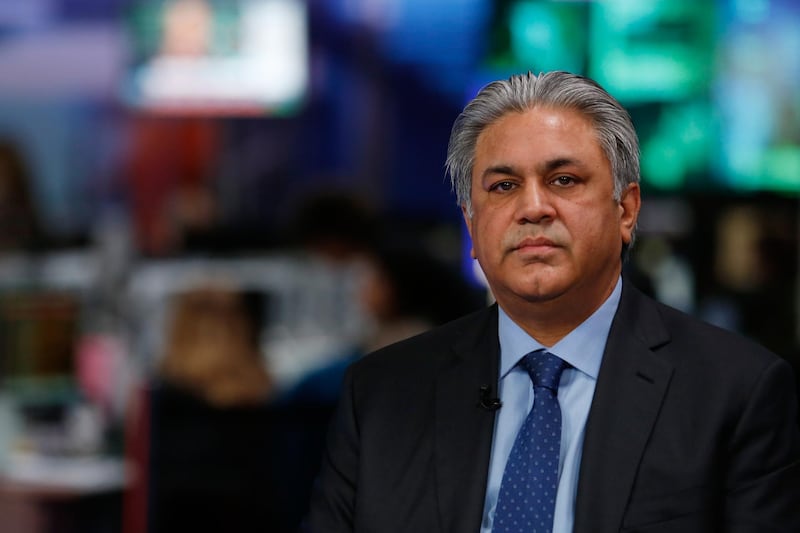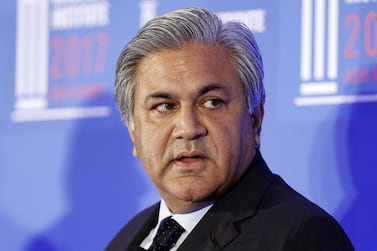Arif Naqvi, the former chief executive of the Abraaj Group, which collapsed last year in the world's biggest private-equity insolvency, was arrested in the UK on US charges of defrauding investors.
Former managing partner Mustafa Abdel-Wadood was also arrested on Thursday in New York and is being held in a federal prison after a brief court appearance. He pleaded not guilty to securities fraud, wire fraud and conspiracy charges, which in the US can mean jail time of up to 30 years.
Mr Abdel-Wadood's lawyer Benjamin Brafman – who has represented high-profile clients including a previous IMF managing director Dominique Strauss-Kahn, American singer Sean Combs and Harvey Weinstein – declined to comment when contacted by The National.
In brief indictments revealed on Thursday, US federal prosecutors claimed that from possibly 2014 until Abraaj's collapse, Mr Naqvi and Mr Abdel-Wadood lied about the performance of the company's funds, inflating their value by more than half a billion dollars, Reuters reported.
Mr Naqvi appeared in a court in London on Thursday and was placed in custody to appear again on April 18 at Westminster Magistrates Court for the extradition case via a video link, a court official told Reuters on Friday.
A statement from Mr Naqvi's external PR company said: "Mr Naqvi maintains his innocence, and he fully expects to be cleared of any charges. For almost a year since the commencement of the provisional liquidations, he has been working tirelessly to maximise returns for Abraaj's creditors."
The separate related civil charges brought forward by the US Securities and Exchange Commission allege that Abraaj Investment Management and its founder Mr Naqvi defrauded the Abraaj Growth Markets Health Fund and US investors by misappropriating over $230 million in fund money, according to the complaint filed on Thursday at a US District Court in New York.
The fraud took place “from at least September 2016 until at least June 2018”.
Mr Naqvi founded the Abraaj Group, a group of equity funds that include Abraaj Investment Management and Abraaj Holdings, in 2002.
The Dubai-based company, which had almost $14 billion (Dh51.4bn) of assets under management in 2018, was forced into liquidation in June last year after investors, including the Bill & Melinda Gates Foundation, commissioned an audit to investigate the alleged mismanagement of money in its healthcare fund.
Other investors in the fund include the World Bank’s International Finance Corporation, Britain’s CDC Group and Proparco Group of France.
According to the US complaint, Abraaj and Mr Naqvi falsely reported to the health fund and its investors that their money would be invested in healthcare-related businesses in emerging markets. Instead, the money was misused to "cover cash shortfalls" at Abraaj Investment Management and its parent company, Abraaj Holdings, "a separate entity that Mr Naqvi largely owned and controlled".
The second key allegation in the complaint is that the “defendants’ materially false statements, omissions and deceptive acts violated the anti-fraud provisions of the Investment Advisers Act of 1940,” a US federal law created to monitor and regulate the activities of investment advisers.
The law is administered by the SEC, which has ordered that the defendants pay monetary penalties for these violations.
The Investor Relations Office and the Abraaj Health Fund's largest US investors were located in New York, and contributions to the fund were transmitted from American bank accounts.
“Defendants’ unlawful conduct abroad had a foreseeable substantial effect within the United States because the deceptive acts involved substantial sums of money contributed by United States investors, and Defendants transmitted misleading information to investors in the United States,” the complaint states.
The Abraaj Health Fund, which was set up in 2015 and had its last investor closing date in July 2016, had a total commitment value of $850m.
In August 2017, a US government entity pledged an additional $150m debt investment through a finance agreement.
The fund’s limited partners paid approximately $544m in capital contributions pursuant to drawdowns, according to the report to investors for the third quarter of 2017.
However, Abraaj Investment Management had invested only approximately $265m in fund portfolio companies. Taking into account the $37.6m in management fees and $2.5m in expenses declared, that left $238.9m of capital still available for the fund's use, the complaint states.
In total, from December 2016, through at least September 2017, Abraaj Investment Management — with the authorisation of Mr Naqvi — transferred at least $230m from Abraaj Health Fund Bank Accounts to Abraaj Holdings and Abraaj Investment Management.
In late 2017 and early 2018, following months of investor demands with regard to where their cash capital contributions were spent, Abraaj Investment Management ultimately returned much of the money it allegedly misappropriated, as well as more than $13m in interest to the Abraaj Health Fund investors.
Below are key events in the timeline, according to the court filing:
December 2016
Abraaj Investment Management transferred $100m of Abraaj Health Fund money from an Abraaj Health Fund bank account to an Abraaj Holdings account, and $40m to Abraaj Investment Management.
January 3, 2017
The Abraaj Group's managing director of finance informed Mr Naqvi and Abraaj's head of finance and operations by email that Abraaj Holdings was expected to have a cash shortfall of $85m by the end of March 2017. The managing director said the cash shortfall would occur despite the $140m recently taken from the health fund, which he described in the email as $128.5m "borrowed" from the fund, and an $11.5m "receivable" involving Abraaj Holdings.
January 19, 2017
Mr Naqvi responded he did not have time to review the managing director's analysis, but he authorised him and the finance head to use "their common sense to process and just don't shut down the business."
February 16, 2017
The managing director emailed Mr Naqvi and the finance head a portion of Abraaj Holdings’ cash balance spreadsheet, and he concluded that Abraaj would have a cash shortfall of $4.2m that month, and they would draw $5m from the Abraaj Health Fund to cover it.
March 2017
Abraaj Investment Management sent investors a drawdown notice requesting an additional $115m from the health fund's limited partners, claiming the money would fund five portfolio companies' "follow-on investments". Internal financial documents of Abraaj and bank records reflect that Abraaj Investment Management had, in fact, only sent funds to two of these five portfolio companies.
On, or around March 15, 2017, Abraaj Investment Management transferred another $8m from an health fund bank account to an Abraaj Investment Management account. An additional $16m was transferred between March 21 and March 30.
June 2017
On, or about June 3, 2017, the managing director reported to Mr Naqvi and the finance head that Abraaj Holdings and Abraaj Investment Management expected to have a $255m payable to the Abraaj Health Fund by the end of the fiscal period ending June 30, 2017.
Mr Naqvi and the managing director, copying the finance head, then considered, as an alternative, whether they could change the Abraaj Health Fund’s fiscal period end to December 31, 2017, to avoid having to release audited financial statements for another six months. The managing director, however, concluded that they could not change the date.
June 24, 2017
A non-US publicly traded airline in which Mr Naqvi served as a director made a short-term 30-day $196m loan to Abraaj Investment Management. This was used to cover the hole in the health fund’s balance sheet left by the transfer of fund money to Abraaj Holdings and Abraaj Investment Management earlier in the year.
July 19, 2017
Shortly after the fund’s June 30, 2017 period-end, Abraaj Investment Management and Mr Naqvi authorised the transfer of $196m back to the airline, which left only about $28m in the Abraaj Health Fund bank account.
September 12, 2017
The managing director sent Mr Naqvi and the finance head a cash flow update by email, noting that a $68m drawdown of investor funds from the Abraaj Health Fund would be available to cover Abraaj Holdings’ and Abraaj Investment Management’s expenses, including Abraaj Holdings’ debt obligations.
October 15, 2017
In response to concerns from Abraaj Health Fund investors, on October 15, 2017, the chief financial officer of the fund emailed the Abraaj Health Fund's Limited Partner Advisory Committee stating the fund had "an available cash balance" of $225.9m, when in fact there was only approximately $13m.
October 22, 2017
On, or around October 22, 2017, Mr Naqvi emailed a large US investor who raised questions regarding the location of the Abraaj Health Fund's remaining capital. Mr Naqvi claimed that Abraaj Investment Management had "decided to keep the uninvested amounts with us" as they await to allot capital to investments that Mr Naqvi claimed were "slightly delayed for reasons beyond our control".
February 2018
Around February 2018, Naqvi admitted to the head of one US investor that Abraaj Health Fund capital contributions were used for Abraaj Holdings' and Abraaj Investment Management's general corporate purposes.
June 2018
Abraaj Investment Management voluntarily declared bankruptcy and entered liquidation proceedings around June 2018, in the Grand Court of the Cayman Islands, where the company had been incorporated.









